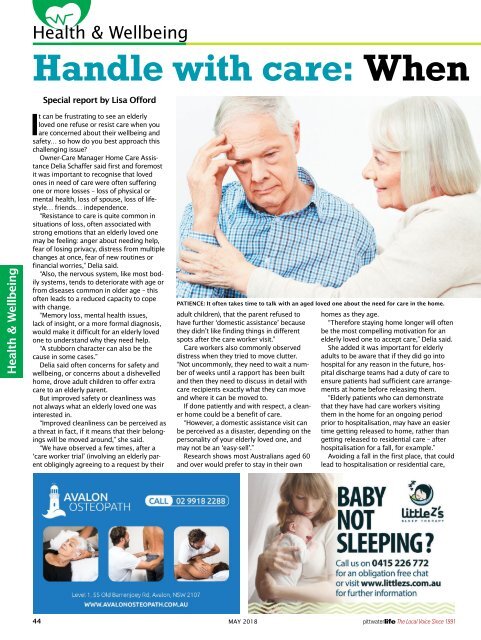Pittwater Life May 2018 Issue
Care Factor - Meet the Hospital's New 'Urgency Team'. Good Sport. Minding Own Business. University of Warriewood?
Care Factor - Meet the Hospital's New 'Urgency Team'. Good Sport. Minding Own Business. University of Warriewood?
You also want an ePaper? Increase the reach of your titles
YUMPU automatically turns print PDFs into web optimized ePapers that Google loves.
Health & Wellbeing<br />
Handle with care: When<br />
Special report by Lisa Offord<br />
Health & Wellbeing<br />
It can be frustrating to see an elderly<br />
loved one refuse or resist care when you<br />
are concerned about their wellbeing and<br />
safety… so how do you best approach this<br />
challenging issue?<br />
Owner-Care Manager Home Care Assistance<br />
Delia Schaffer said first and foremost<br />
it was important to recognise that loved<br />
ones in need of care were often suffering<br />
one or more losses – loss of physical or<br />
mental health, loss of spouse, loss of lifestyle…<br />
friends… independence.<br />
“Resistance to care is quite common in<br />
situations of loss, often associated with<br />
strong emotions that an elderly loved one<br />
may be feeling: anger about needing help,<br />
fear of losing privacy, distress from multiple<br />
changes at once, fear of new routines or<br />
financial worries,” Delia said.<br />
“Also, the nervous system, like most bodily<br />
systems, tends to deteriorate with age or<br />
from diseases common in older age – this<br />
often leads to a reduced capacity to cope<br />
with change.<br />
“Memory loss, mental health issues,<br />
lack of insight, or a more formal diagnosis,<br />
would make it difficult for an elderly loved<br />
one to understand why they need help.<br />
“A stubborn character can also be the<br />
cause in some cases.”<br />
Delia said often concerns for safety and<br />
wellbeing, or concerns about a dishevelled<br />
home, drove adult children to offer extra<br />
care to an elderly parent.<br />
But improved safety or cleanliness was<br />
not always what an elderly loved one was<br />
interested in.<br />
“Improved cleanliness can be perceived as<br />
a threat in fact, if it means that their belongings<br />
will be moved around,” she said.<br />
“We have observed a few times, after a<br />
‘care worker trial’ (involving an elderly parent<br />
obligingly agreeing to a request by their<br />
PATIENCE: It often takes time to talk with an aged loved one about the need for care in the home.<br />
adult children), that the parent refused to<br />
have further ‘domestic assistance’ because<br />
they didn’t like finding things in different<br />
spots after the care worker visit.”<br />
Care workers also commonly observed<br />
distress when they tried to move clutter.<br />
“Not uncommonly, they need to wait a number<br />
of weeks until a rapport has been built<br />
and then they need to discuss in detail with<br />
care recipients exactly what they can move<br />
and where it can be moved to.<br />
If done patiently and with respect, a cleaner<br />
home could be a benefit of care.<br />
“However, a domestic assistance visit can<br />
be perceived as a disaster, depending on the<br />
personality of your elderly loved one, and<br />
may not be an ‘easy-sell’.”<br />
Research shows most Australians aged 60<br />
and over would prefer to stay in their own<br />
homes as they age.<br />
“Therefore staying home longer will often<br />
be the most compelling motivation for an<br />
elderly loved one to accept care,” Delia said.<br />
She added it was important for elderly<br />
adults to be aware that if they did go into<br />
hospital for any reason in the future, hospital<br />
discharge teams had a duty of care to<br />
ensure patients had sufficient care arrangements<br />
at home before releasing them.<br />
“Elderly patients who can demonstrate<br />
that they have had care workers visiting<br />
them in the home for an ongoing period<br />
prior to hospitalisation, may have an easier<br />
time getting released to home, rather than<br />
getting released to residential care – after<br />
hospitalisation for a fall, for example.”<br />
Avoiding a fall in the first place, that could<br />
lead to hospitalisation or residential care,<br />
44 MAY <strong>2018</strong><br />
The Local Voice Since 1991

















